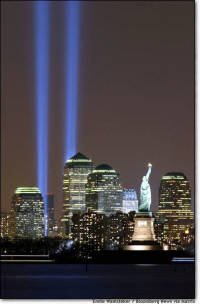Closure and that "hole in the ground"
 For many, the day of September 11th will be marred forever by the horrific and almost surreal events that unfolded that day in 2001. Five years later, many struggle to define how the attacks affected them personally or to find closure. It’s been stated that it takes five years to overcome a great loss, be it a death, a separation or an event that jolted your reality so much that it forced you to reexamine your life.
For many, the day of September 11th will be marred forever by the horrific and almost surreal events that unfolded that day in 2001. Five years later, many struggle to define how the attacks affected them personally or to find closure. It’s been stated that it takes five years to overcome a great loss, be it a death, a separation or an event that jolted your reality so much that it forced you to reexamine your life.Although not the most articulate man, New Orleans Mayor, Ray Nagin, compared his frustration with recovery from a devastating blow from a hurricane to the terrorist attacks on the World Trade Center in New York City: ”It’s been five years and you guys still can’t fix a hole in the ground.” Many were outraged at Nagin’s insensitive remark about the footprints of the WTC, now considered “scared ground.” But was Nagin really wrong? What do you do with a hole that cannot be filled?
Five years later, the most powerful country in the world cannot come to grips to build a memorial or come up with any cohesive plan for developing “ground zero.” Five years later we are still holding ceremonies at the WTC site to reflect and mourn reading the names of those lost in the attacks. When do we stop mourning and begin to heal? What do you do with a hole that cannot be filled?
For many who lost loved ones at the World Trade Center, “the hole” is the last place their mother, father, sister, husband, wife, partner existed in this world and so they go to grieve. It’s like driving on an interstate or highway and you see a small cross and flowers where someone perished in a car accident. How do you define a place that has brought so much pain? What do you do with a hole that cannot be filled?
Is it possible that closure comes from accountability and justice? After the attacks on 9/11, our nation came together and backed our President as the hunt for Osama bin Laden began in the mountains of Afghanistan. The enemy was clear and the mission obvious, yet five years later bin Laden has eluded capture. And in a “scratch your head” strategy, the Bush administration decided that Iraq and Suddam Hussein were linked with bin Laden and took a preemptive strike bringing us to war with the country.
A country once united after the worst attacks on U.S. soil is now clearly moving away from the President’s “wrong turn” strategy in the war against terror. It is clear that we must secure our borders and turn our attention back to bin Laden and the Taliban. The war in Iraq is an immense blunder that has created useless instability in the region. For George W. Bush, this folly will be his legacy. He will remain defiant knowing that a withdrawal means an explanation to the loved ones who have lost so many that he failed.
The perpetrators of the attacks on 9/11 are still at large. Maybe that's why “the hole” cannot be filled.


<< Home